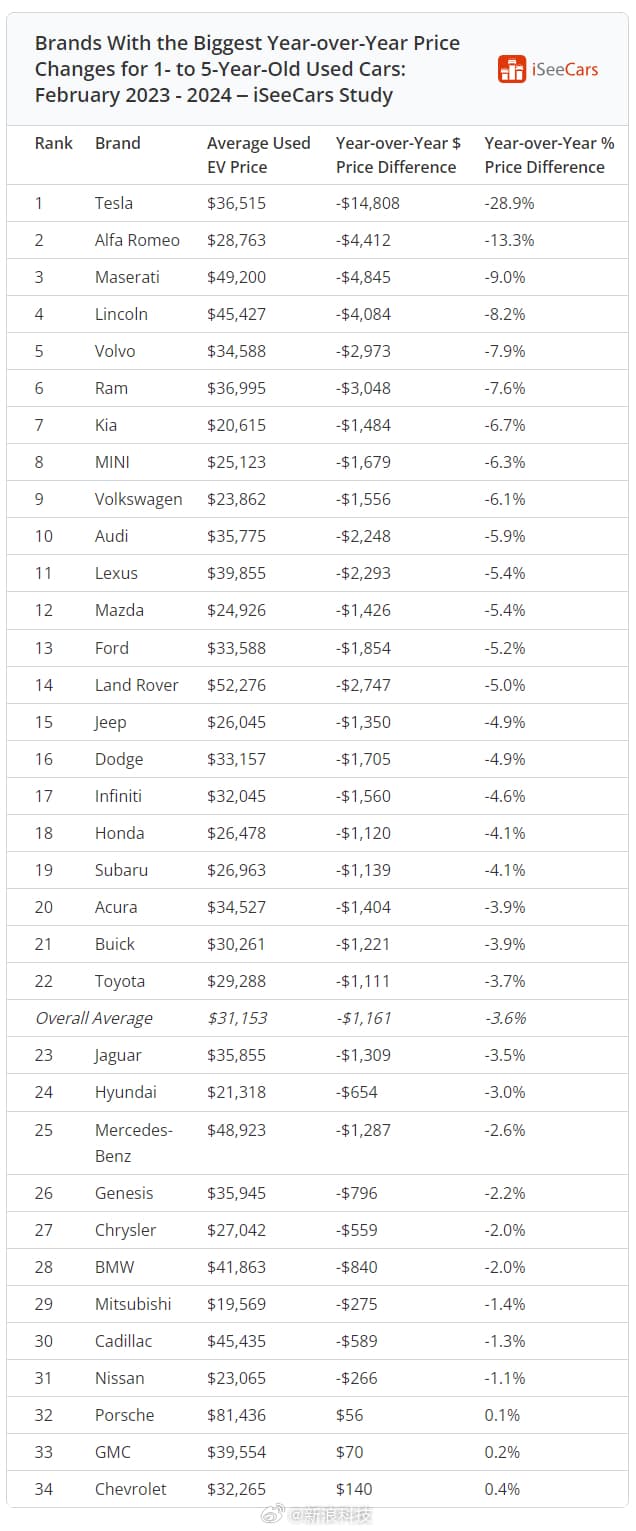Tesla Tops List of Fastest Depreciating Used Cars in US Market
Tesla Emerges as Unprecedented Leader in Second-Hand Car Depreciation: A Comprehensive Report In an unexpected turn of events, Tesla has recently been crowned the king of second-hand car depreciation. According to a new study released by iSeeCars, the American electric vehicle manufacturer has surpassed luxury brands like Ferrari and Maserati to become the automaker with the fastest depreciation rate for used cars in the United States market.

14 March 2024
Tesla's success in this somewhat dubious category is provoking mixed reactions within the car industry. The latest research conducted by iSeeCars evaluated data collected from approximately 180 million used cars with a usage period of 1 to 5 years. The study focused on assessing vehicle value, sales statistics, and other related data to determine the decrease in value for each car model. In this study, Tesla emerged as the leading brand, with the average price of a used Tesla vehicle depreciating by 28.9% (approximately $14,808) within a year. This figure is significantly higher than Ferrari and Maserati's depreciation rates and is three times greater than that of the Alfa Romeo and double that of the Maserati.
Karl Brauer, the executive analyst at iSeeCars, commented on the impact of Tesla's pricing strategy: "The price-cutting strategy adopted by Elon Musk to maintain the sales of new Tesla vehicles has had a devastating effect on the resale value of the brand's vehicles." The iSeeCars study shows the following top 10 brands with the highest depreciation rates for used cars:

- Tesla - Average Used EV Price: $36,515; Year-over-Year Price Difference: -$14,808; Year-over-Year Percentage: -28.9% 2. Alfa Romeo - Average Used Price: $28,763; Year-over-Year Price Difference: -$4,412; Year-over-Year Percentage: -13.39% 3. Maserati - Average Used Price: $49,200; Year-over-Year Price Difference: -$4,845; Year-over-Year Percentage: -9.09% 4. Lincoln - Average Used Price: $45,427; Year-over-Year Price Difference: -$4,084; Year-over-Year Percentage: -8.2% 5. Volvo - Average Used Price: $34,588; Year-over-Year Price Difference: -$2,973; Year-over-Year Percentage: -7.99% 6. Ram - Average Used Price: $36,995; Year-over-Year Price Difference: -$3,048; Year-over-Year Percentage: -7.69% 7. Kia - Average Used Price: $20,615; Year-over-Year Price Difference: $+1,484; Year-over-Year Percentage: -6.7% 8. MINI - Average Used Price: $25,123; Year-over-Year Price Difference: -$1,679; Year-over-Year Percentage: -6.39% 9.
Volkswagen - Average Used Price: $23,862; Year-over-Year Price Difference: -$1,556; Year-over-Year Percentage: -6.19% 10. Audi - Average Used Price: $35,775; Year-over-Year Price Difference: -$2,248; Year-over-Year Percentage: -5.99%
Some industry experts argue that the rapid depreciation of Tesla vehicles may be attributed to the company's aggressive pricing strategy, which has seen them slash prices multiple times in recent years to boost sales in the wake of supply chain disruptions and rising interest rates. This approach has made Tesla vehicles more affordable for consumers but has come at the expense of their resale value. Moreover, the high depreciation rate of electric vehicles, in general, is not a new phenomenon. As with any new technology, early adopters tend to pay a premium for the privilege of owning the latest innovations. However, as new models with better features and lower prices come onto the market, demand for older models declines, leading to a steep drop in resale values.
Nevertheless, the iSeeCars study only analyzes the American market and does not examine the situation in China or other major markets, where Tesla has a strong presence. In the Chinese market, for instance, Tesla vehicles hold their value much better than in the United States. In response to the iSeeCars study, some Weibo users have argued that focusing on the depreciation rate of electric vehicles may not be entirely fair, as these vehicles are subject to much more rapid technological advancements and shorter product cycles compared to traditional internal combustion engine vehicles. As a result, the rate at which electric vehicles depreciate is greater but also more predictable, making it easier for buyers and sellers to factor this into their purchasing decisions. Some Chinese netizens have also suggested that Tesla's competitive pricing strategy in the United States may not necessarily translate to other markets, such as China, where the brand benefits from government subsidies, strong brand recognition, and a growing demand for electric vehicles. In conclusion, while Tesla's position as the fastest depreciating brand for used cars in the United States is undeniable, the implications of this finding are more complex than they may initially appear. Factors such as technological advancements, a growing global trend towards electric mobility, and regional market conditions all play a role in determining the value of electric vehicles. As the automotive industry continues to evolve, it will be interesting to see how these factors shape the future of electric vehicles and their resale values.




